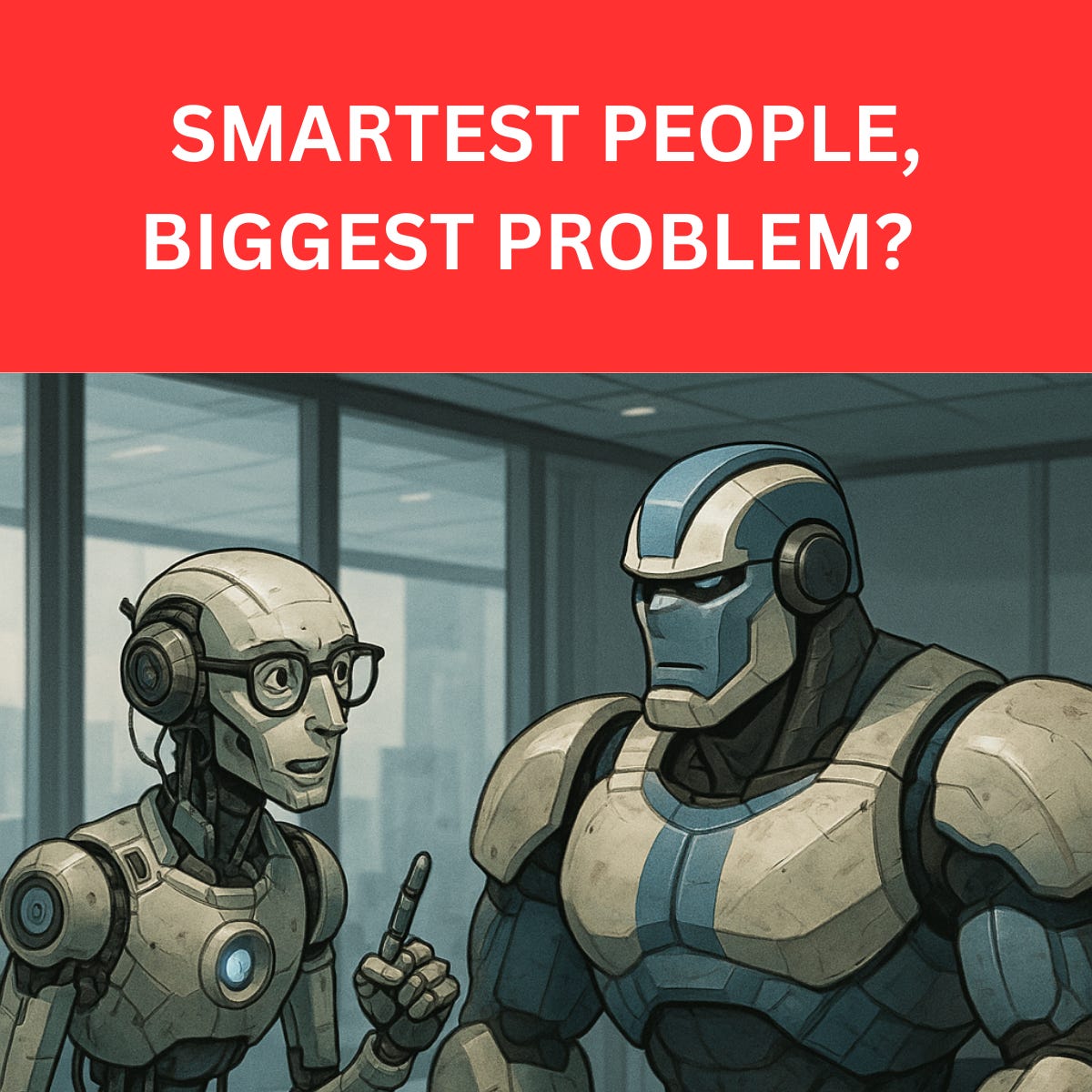Why Your Smartest People Are Your Biggest Problem
Smart people need smart change strategies. Let's design yours.
Hi there,
The smartest people in your business are the biggest strength and biggest risk to your AI transformation. If you can’t get them onboard and championing change, your AI transformation is at serious risk of failure.
RAND notes that by some estimates, more than 80% of AI projects fail. Boston Consulting Group found only 4% of companies creating substantial value from AI in 2024.
The difference? Whether your smartest people are fighting you or fighting for you.
Your Best People Determine Everything
Your experts aren't obstacles. They're the only path to success. But right now, they're blocking AI transformation because you're not investing enough in them.
When smart people champion AI, everyone follows. When they resist, everyone has permission to fail. Prosci's research shows projects with excellent change management are 6 to 7 times more likely to meet objectives. But here's what nobody measures: when your top performers lead that change, the multiplier explodes.
MIT CISR studied 721 companies. Stage 4 companies achieved growth 17.1 percentage points above industry average. Stage 1 companies fell 12.6 percentage points below. The difference wasn't better algorithms. It was whether smart people designed the transformation or fought it.
Your experts hold all the power. Treat them right, and they'll drive your success. Ignore their needs, and they'll guarantee your failure.
They're Not Resisting, They're Warning You
Your smartest people see threats you don't. They built careers on expertise, control, and delivering flawless work. Now you're asking them to embrace probabilistic systems that learn from mistakes. Of course they resist.
But their resistance isn't emotional. It's logical. They understand that AI threatens their identity, their value, their entire professional framework. They know you're asking them to champion something that could diminish them. And they're right to be concerned.
Pew Research found 52% of workers are worried about AI at work, while only 29% are excited. The gap between concern and enthusiasm reveals the truth: the way organisations implement AI threatens what people have built. Until you address that threat, your best people won't just resist. They'll actively undermine.
The Investment That Changes Everything
Boston Consulting Group's survey of 1,000 executives revealed what separates the 4% who succeed from everyone else: the 10-20-70 rule. Just 10% on algorithms, 20% on technology, but 70% on people and culture.
That 70% isn't generic training. It's specific investment in your highest performers. Psychological safety protocols that protect their identity. New performance metrics that value experimentation alongside expertise. Career paths that expand because of AI, not despite it.
Nature Human Behaviour's meta-analysis of 106 studies shows why this matters. When humans outperform AI, adding AI creates synergy. But when AI outperforms humans, forced collaboration destroys value. Your experts know where they add value and where they don't. Let them design the division of labour, and resistance transforms into ownership.
The pattern is consistent: when experts architect the solution, they defend it. When it's imposed on them, they attack it.
Turn Them Into Champions or Fail
Your smartest people need more than you're giving them. They need to know their expertise remains valuable. They need control over how AI integrates with their work. They need investment that matches the risk they're taking.
When companies position AI as augmentation rather than automation, when they let experts set quality standards, when they fund real psychological safety, something remarkable happens. The same people who killed previous initiatives become the most passionate advocates.
These champions don't just support AI. They design better implementations. They spot problems before they explode. They bring everyone else along because people trust expertise, not mandates.
Your smart people are expensive. Not because they resist, but because they're worth it. They'll make your AI transformation succeed or fail. Right now, most are ensuring failure because you're not investing enough in their success.
The Choice Is Simple
Companies creating value from AI don't have better technology. They have leaders who recognise that smart people are their most critical asset and invest accordingly.
Stop treating expert resistance as a problem to solve. Start treating it as your roadmap to success. Every objection tells you what to build. Every concern shows you where to invest. Every resistant expert is a future champion waiting for the right investment.
Your smartest people aren't your biggest problem. They're your biggest opportunity. But only if you're willing to go above and beyond to keep them engaged, protected, and championing change.
Most companies underinvest in their experts and wonder why AI initiatives fail. The few who succeed recognise that expert buy-in isn't optional. It's everything.
Which group will you join?
How I Can Help
Ready to transform resistance into results? Let's design a human-centred AI strategy that works with your brightest minds. I help business owners and leaders unfreeze AI transformations by addressing the change management challenges that stop technical progress cold. Book your consultation today.
PS: If you’re not following me on LinkedIn, I’m writing more articles there on AI transformation.
References
Boston Consulting Group (2024). Global survey of 1,000 executives. 4% creating substantial value; 10-20-70 investment principle.
MIT CISR (2024). Building Enterprise AI Maturity. 721 companies studied. Stage 1: -12.6 percentage points growth. Stage 4: +17.1 percentage points.
Nature Human Behaviour (2024). "When combinations of humans and AI are useful." Meta-analysis of 106 experimental studies.
Pew Research Center (2025). Workers' views of AI in the workplace. 52% worried, 29% excited.
Prosci (2021-2025). Best Practices in Change Management. Projects with excellent change management 6-7x more likely to meet objectives.
RAND Corporation (2024). The Root Causes of Failure for AI Projects. Notes "by some estimates, more than 80% of AI projects fail."



lol
Hahahahahahaha
So effin TRUE
ciao Brennan